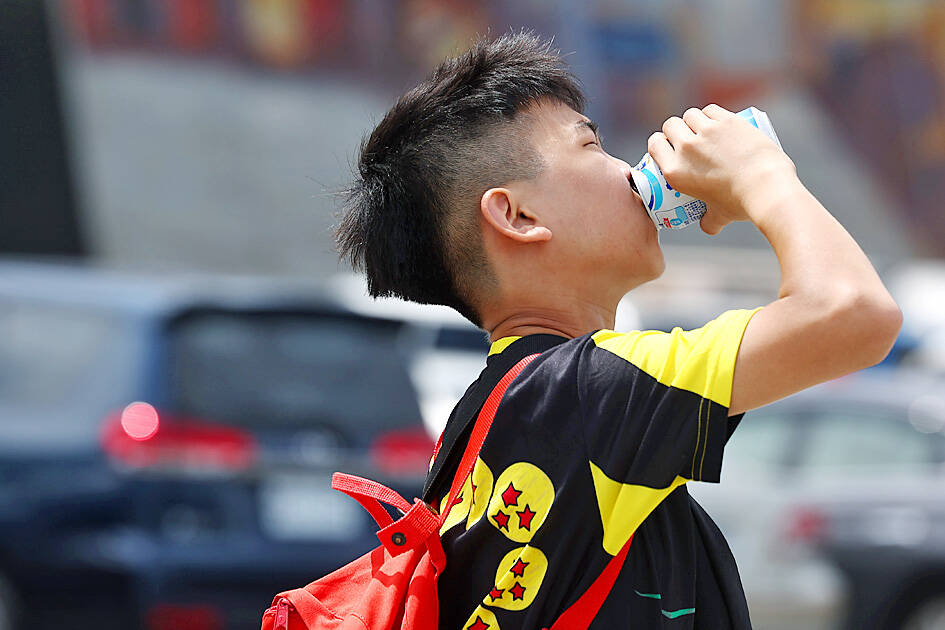People should be cautious about consuming iced drinks, ice or staying too long in air-conditioned environments, as traditional Chinese medicine theory says that it might hinder the body’s ability to expel summer heat, a Taipei-based traditional Chinese medicine practitioner said.
As of Saturday, there have been more than 379 cases of heat injuries since June 1, Ministry of Health and Welfare data showed.
Lee Ho-chen (李和蓁), a practitioner at the Taipei Fertility Center’s Songren Obstetrics, Gynecology, and Chinese Medicine Clinic, said that while drinking some iced or cool beverages during the summer is not entirely off-limits, people should choose drinks that help balance the body’s yin (陰) energies and reduce internal heat.

Photo: CNA
Lee recommended bitter gourd, lotus plumule, smoked plum, hawthorn and lemon as beverages that can help shed heat, increase salivation and stimulate the appetite.
She also suggested Chinese herbal tea, mesona tea and watermelon juice as suitable drinks to alleviate the summer heat, but advised limiting consumption to one glass per day, preferably consumed at high noon. Consuming such drinks in the afternoon or evening, when the body has already cooled down, would make it harder for the body to process them, the practitioner said, adding that overconsumption of such beverages might be particularly problematic for people already experiencing diarrhea or stomach discomfort.
Lee also cited an increase of “air-conditioning sickness,” which includes vertigo, headaches, weakness, lack of appetite and cold-like symptoms without respiratory issues.
The body’s ability to regulate heat is easily disrupted when transitioning frequently between air-conditioned rooms and non-air-conditioned spaces with a temperature difference of 5°C or more, she said.
According to traditional Chinese medicine theory, this could result in the accumulation of summer heat within the body, which cannot be expelled through sweating, potentially leading to heat stroke, she added.
To minimize the temperature differences and reduce the risk of air-conditioning sickness, Lee recommended wearing light jackets and drinking warm water when moving between air-conditioned and non-air-conditioned spaces.
Sweating is the body’s natural way of regulating heat, she said, adding that people should exercise outdoors for 30 minutes at a time, three to five times a week, to encourage the body to sweat and naturally expel heat.
The ministry has advised wearing light-colored, thin clothing, setting air-conditioners to 26°C to 28°C, and seeking shade when outdoors, adding that people should rehydrate regularly and refrain from alcohol and sweet drinks.
People should be vigilant for symptoms of heat exhaustion, avoid outdoor activities between 10am and 2pm, and assist those experiencing heat exhaustion by reducing heat and rehydrating them, while seeking emergency help, it said.

A 72-year-old man in Kaohsiung was sentenced to 40 days in jail after he was found having sex with a 67-year-old woman under a slide in a public park on Sunday afternoon. At 3pm on Sunday, a mother surnamed Liang (梁) was with her child at a neighborhood park when they found the man, surnamed Tsai (蔡), and woman, surnamed Huang (黃), underneath the slide. Liang took her child away from the scene, took photographs of the two and called the police, who arrived and arrested the couple. During questioning, Tsai told police that he had met Huang that day and offered to

LOOKING NORTH: The base would enhance the military’s awareness of activities in the Bashi Channel, which China Coast Guard ships have been frequenting, an expert said The Philippine Navy on Thursday last week inaugurated a forward operating base in the country’s northern most province of Batanes, which at 185km from Taiwan would be strategically important in a military conflict in the Taiwan Strait. The Philippine Daily Inquirer quoted Northern Luzon Command Commander Lieutenant General Fernyl Buca as saying that the base in Mahatao would bolster the country’s northern defenses and response capabilities. The base is also a response to the “irregular presence this month of armed” of China Coast Guard vessels frequenting the Bashi Channel in the Luzon Strait just south of Taiwan, the paper reported, citing a

A total lunar eclipse, an astronomical event often referred to as a “blood moon,” would be visible to sky watchers in Taiwan starting just before midnight on Sunday night, the Taipei Astronomical Museum said. The phenomenon is also called “blood moon” due to the reddish-orange hue it takes on as the Earth passes directly between the sun and the moon, completely blocking direct sunlight from reaching the lunar surface. The only light is refracted by the Earth’s atmosphere, and its red wavelengths are bent toward the moon, illuminating it in a dramatic crimson light. Describing the event as the most important astronomical phenomenon

BETTER SERVICE QUALITY: From Nov. 10, tickets with reserved seats would only be valid for the date, train and route specified on the ticket, THSRC said Starting on Nov. 10, high-speed rail passengers with reserved seats would be required to exchange their tickets to board an earlier train. Passengers with reserved seats on a specific train are currently allowed to board earlier trains on the same day and sit in non-reserved cars, but as this is happening increasingly often, and affecting quality of travel and ticket sales, Taiwan High-Speed Rail Corp (THSRC) announced that it would be canceling the policy on Nov. 10. It is one of several new measures launched by THSRC chairman Shih Che (史哲) to improve the quality of service, it said. The company also said